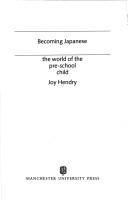| Listing 1 - 3 of 3 |
Sort by
|

ISBN: 0719022843 Year: 1986 Publisher: Manchester : Manchester University Press,
Abstract | Keywords | Export | Availability | Bookmark
 Loading...
Loading...Choose an application
- Reference Manager
- EndNote
- RefWorks (Direct export to RefWorks)
J4955 --- J4127 --- J4204.10 --- J4222 --- Japan: Education -- preschool, kindergartens and elementary education --- Japan: Sociology and anthropology -- social identity and self --- Japan: Sociology and anthropology -- communities -- age groups -- children, infants --- Japan: Sociology and anthropology -- social policy and pathology -- children, infants
Book
ISBN: 0804798567 9780804798563 9780804797078 0804797072 9780804798532 0804798532 Year: 2016 Publisher: Stanford, California
Abstract | Keywords | Export | Availability | Bookmark
 Loading...
Loading...Choose an application
- Reference Manager
- EndNote
- RefWorks (Direct export to RefWorks)
The Strange Child examines how the Japanese financial crisis of the 1990s gave rise to "the child problem," a powerful discourse of social anxiety that refocused concerns about precarious economic futures and shifting ideologies of national identity onto the young. Andrea Gevurtz Arai's ethnography details the different forms of social and cultural dislocation that erupted in Japan starting in the late 1990s. Arai reveals the effects of shifting educational practices; increased privatization of social services; recessionary vocabulary of self-development and independence; and the neoliberalization of patriotism. Arai argues that the child problem and the social unease out of which it emerged provided a rationale for reimagining governance in education, liberalizing the job market, and a new role for psychology in the overturning of national-cultural ideologies. The Strange Child uncovers the state of nationalism in contemporary Japan, the politics of distraction around the child, and the altered life conditions of—and alternatives created by—the recessionary generation.
Education --- Patriotism --- National characteristics, Japanese. --- Recessions --- Business cycles --- Depressions --- Japanese national characteristics --- Children --- Education, Primitive --- Education of children --- Human resource development --- Instruction --- Pedagogy --- Schooling --- Students --- Youth --- Civilization --- Learning and scholarship --- Mental discipline --- Schools --- Teaching --- Training --- Social aspects --- Psychological aspects. --- Japan --- Social conditions --- National characteristics, Japanese --- Psychological aspects --- J4935 --- J4900.90 --- J4122 --- J4000.90 --- J4204.10 --- Japan: Education -- educational psychology and sociology --- Japan: Education -- history -- postwar Shōwa (1945- ), Heisei period (1989- ), contemporary --- Japan: Sociology and anthropology -- nationalism --- Japan: Social history, history of civilization -- postwar Shōwa (1945- ), Heisei period (1989- ), contemporary --- Japan: Sociology and anthropology -- communities -- age groups -- children, infants
Book
ISBN: 9780415436496 0415436494 1780346697 9786613103321 128310332X 1136736271 0203818458 9780203818459 9781136736223 9781136736261 9781136736278 9780415709149 0415709148 Year: 2011 Publisher: Abingdon, Oxon: Routledge,
Abstract | Keywords | Export | Availability | Bookmark
 Loading...
Loading...Choose an application
- Reference Manager
- EndNote
- RefWorks (Direct export to RefWorks)
The Routledge Handbook of Japanese Culture and Society is an interdisciplinary resource that focuses on contemporary Japan and the social and cultural trends that are important at the beginning of the twenty-first century. This Handbook provides a cutting-edge and comprehensive survey of significant phenomena, institutions, and directions in Japan today, on issues ranging from gender and family, the environment, race and ethnicity, and urban life, to popular culture and electronic media. Written by an international team of Japan experts, the chapters included in the volume form an accessible and fascinating insight into Japanese culture and society. As such, the Handbook will be an invaluable reference tool for anyone interested in all things Japanese. Students, teachers and professionals alike will benefit from the braid ranging discussions, useful links to online resources and suggested reading lists.
J4140.90 --- J4100 --- Japan: Sociology and anthropology -- cultural history -- postwar Shōwa (1945- ), Heisei period (1989- ), contemporary --- Japan: Sociology, anthropology and culture in general --- -21st century. --- J4000.90 --- J4143 --- Japan: Social history, history of civilization -- postwar Shōwa (1945- ), Heisei period (1989- ), contemporary --- Japan: Sociology and anthropology -- cultural trends and movements -- popular culture --- Japan --- Nihon --- Nippon --- Iapōnia --- Zhāpān --- I︠A︡ponii︠a︡ --- Yapan --- Japon --- Japão --- Japam --- Mư̄ang Yīpun --- Prathēt Yīpun --- Yīpun --- Jih-pen --- Riben --- Government of Japan --- 日本 --- 日本国 --- Nipponkoku --- Nippon-koku --- Nihonkoku --- Nihon-koku --- State of Japan --- Япония --- Japani --- اليابان --- al-Yābān --- يابان --- Yābān --- Japonsko --- Giappone --- Japonia --- Japonya --- Civilization --- Social conditions --- Civilisation --- Conditions sociales --- J4150.90 --- J4600.90 --- J4900.90 --- J1700.90 --- J4170 --- J4176.10 --- J4200.80 --- J4204.10 --- J4203 --- J6850 --- J6900.90 --- Japan: Politics and law -- history -- postwar Shōwa (1945- ), Heisei period (1989- ), contemporary --- Japan: Education -- history -- postwar Shōwa (1945- ), Heisei period (1989- ), contemporary --- Japan: Religion in general -- history -- postwar Shōwa (1945- ), Heisei period (1989- ), contemporary --- Japan: Sociology and anthropology -- family --- Japan: Sociology and anthropology -- gender roles, women, feminism -- policy, legislation, guidelines, codes of behavior --- Japan: Sociology and anthropology -- social classes and groups, social systems and discrimination -- history --- Japan: Sociology and anthropology -- communities -- age groups -- children, infants --- Japan: Sociology and anthropology -- communities -- social classes and groups -- outcasts, burakumin, hinin --- Japan: Games, toys and hobbies --- Japan: Sports and recreation -- history -- postwar Shōwa (1945- ), Heisei period (1989- ), contemporary --- Civilization. --- Social history. --- 2000-2099. --- Japan. --- Japan - Civilization - 21st century --- Japan - Social conditions - 21st century --- Jepun --- Yapon --- Yapon Ulus --- I︠A︡pon --- Япон --- I︠A︡pon Uls --- Япон Улс
| Listing 1 - 3 of 3 |
Sort by
|

 Search
Search Feedback
Feedback About UniCat
About UniCat  Help
Help News
News